Film of the Week: Phantom Thread
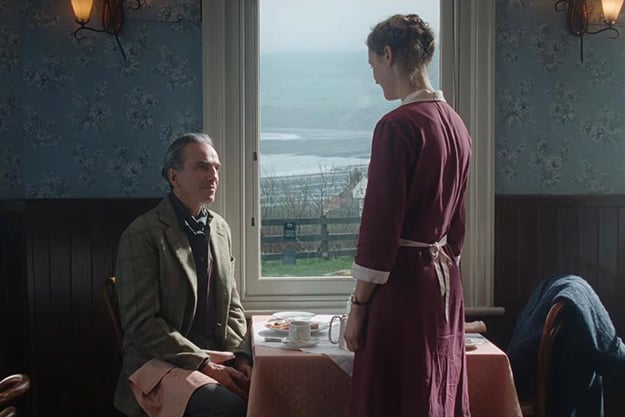
Paul Thomas Anderson’s Phantom Thread is a film about clothes, but it is manifestly not about fashion. At one point, the word “chic” makes society dress designer Reynolds Woodcock (Daniel Day-Lewis) simply recoil; for we are in mid-’50s London, and the foreign word represents all the things that threaten to make this classicist of sartorial beauty eventually démodé. Yet Reynolds has never been modish, for his craft isn’t fashion but couture, which is something else entirely—something supposedly ineffable and beyond the dictates of mere trend.
In its fascinated, yet skeptical depiction of the mystique of the clothing craft, Phantom Thread reminded me of a scene in Pierre Thoretton’s 2010 documentary about Yves Saint-Laurent, L’Amour Fou. There’s a scene in which the elderly designer hobbles into a room full of models and attendants to put the finishing touch to a dress about to be displayed. He leans forward, peers closely and, if I remember rightly, makes a tiny gesture of adjustment to a button or a ribbon, some barely perceptible touch—and, as if before the Sun King at Versailles, everyone gasps in admiration at the inscrutable magic of a master. It’s possible that someone even gasps, “Sublime.”
In Phantom Thread, something of the same mystery surrounds the work of Reynolds Woodcock, but the film never ridicules the preciousness of his world, but rather, takes it deadly seriously, attends it with all due respect. But what the film does, with a touch as masterly and as discreet as Reynolds’s own, is to take its subject and, as the title might suggest, gently but firmly unravel it.
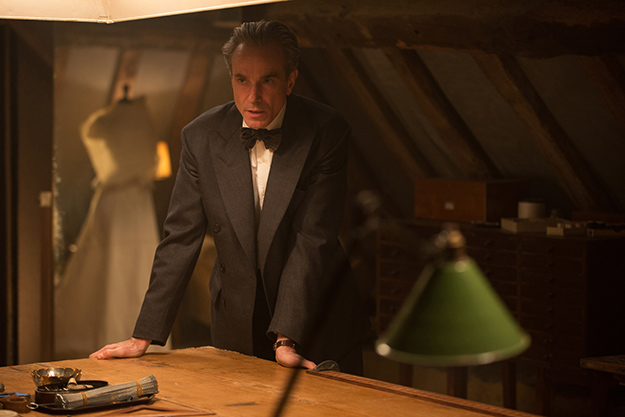
In recent films, Paul Thomas Anderson has specialized in monsters, in unforgiving, controlling males with horrifying, exacting appetites: Day-Lewis’s oilman Plainview in There Will be Blood, cult leader Lancaster Dodd in The Master. In this sense, Phantom Thread feels like the completion of a trilogy, if we skip the addled exuberance of Anderson’s Thomas Pynchon adaptation Inherent (or if you prefer, Incoherent) Vice. After that film, Phantom Thread sees Anderson reverting to even more of a classical register than before: while those other two films alluded to genre while not strictly being of any genre, his latest is a melodrama in a bygone mode, and could be taken as face value as just that. It’s the first Anderson film that my mother, or even my grandmother, might have liked (with this film, thoughts of mothers matter a lot).
Phantom Thread is not strictly the story of Reynolds Woodcock, nor that of the young woman he lives with, Alma (Vicky Krieps), although she narrates the story in intermittent voiceover, and the film brings us closest to her experience. Rather it’s about her relationship with Reynolds, and with his sister Cyril (Lesley Manville), making this really the story of a toxic family triangle. Alma becomes less Reynolds’s lover than something like a nervously tolerated daughter sharing a home with two difficult parents—parents who are controlling and disapproving, but in Reynolds’s case, sometimes doting.
As for Alma, you can’t really call her Reynolds’s lover or partner; “consort” might do the trick, but “muse” says it all, although that world is hard to define. At the start of the film, Alma’s fireside confession says everything about the intensity and damage implicit in the relationship: “He has made my dreams come true. . . I have given him what he desires most in return—every piece of me.” But what are Alma’s dreams? That’s the perpetual enigma of such stories, and one that Shaw’s Pygmalion asked: what does the muse want? One of the subtleties of the film is that we’re never quite told; but we sense that, whatever she does want, she’s not going to get easily.
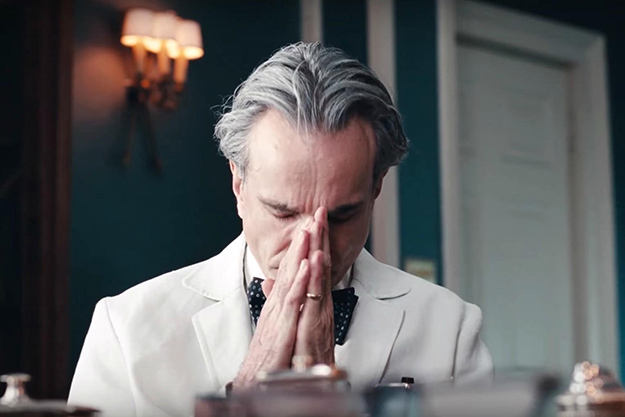
There Will Be Blood and The Master are indisputably—like most PTA films since Boogie Nights—big, expansive movies. What’s remarkable about Phantom Thread is that it’s essentially a small drama, effectively a chamber piece for three main performers, set largely within the confines of Reynolds’s London home cum studio. At the same time, it feels like a big film in the way that some ’40s and ’50s Hollywood romances feel vast, despite restricted settings: it’s executed with great opulence, with a sense of detail that makes it seem hugely expansive.
As Alma says, Reynolds is “a most demanding man.” He’s a perfectionist—too refined to be a dandy, simply an Englishman of precise tastes and habits. At the start of the film, we see him shaving, trimming his nasal hairs, putting on remarkably long luxurious-looking socks. Reynolds is an aesthete, and a delicately tuned neurasthenic bundle of anxiety: a Marcel Proust of the rag trade. Early on, we see him at breakfast, refusing—despite her desperate efforts—to give his attention to a young woman named Johanna (Camilla Rutherford, her extraordinary eyes blazing with anxiety). “I simply don’t have time for confrontations,” he sighs—and we know that Johanna will soon be leaving the house, dispensed with like last season’s ball gown.
Reynolds soon heads off to do the one thing that seems to give him release—take a brisk, breeze-whipped drive to his country house. It’s while stopping off for breakfast at a seaside hotel that he lays eyes upon a vision. This is Alma, a candid-featured, rather clumsy and hesitant waitress, of a quiet beauty that you could easily fail to remark on—or be knocked down by if the light is coming from the right direction, Vermeer-style. Reynolds puts on a quietly dashing, benignly admiring show of flirtation; she responds with a note on his napkin, “For the hungry boy.” He invites her to dinner, and they seem to click in a tender, decorous way that would scarcely have shocked Celia Johnson. Yet they go all the way on their first date—that is, by the end of the evening, he has her standing still to be pinned into his latest creation. Alma’s bafflement in this scene is priceless, as Cyril jots down her measurements for Reynolds.
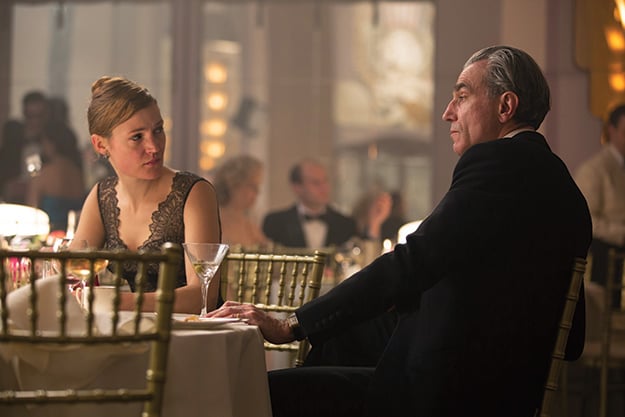
Swept off your feet, in the grand romantic tradition, Alma is hardly a rough diamond—raw silk, perhaps—but Reynolds intends to craft her into a figure of absolute elegance. “In his work,” she says, “I become perfect.” He knows he’s the god who can make that happen: “You have no breasts,” he remarks. “My job to give you some. If I choose to.” What she gives him, initially at least, is the proper pliability of a muse: “I can stand endlessly. No one can stand as long as I can.”
After the restrained sexiness of their first meeting, we never quite know what goes on erotically between Alma and Reynolds, if anything. We see her shut out of his bedroom, standing humiliated as Cyril glides through proprietorially with his tea tray. Reynolds says he’s a “confirmed bachelor”—that archaic euphemism for being gay—but he’s really married to his art, and in a way to Cyril, and of course to dear dead Mama, haunted by her scent, always hoping she can see his work: “It’s comforting to think the dead are watching over the living.” We might assume he’s homosexual or asexual, but he loves women, or at least his own distorting idea of female perfection.
But there is a love between him and Alma, and it emerges to increasingly unsettling effect. One of Reynolds’s clients is a wealthy middle-aged woman, the boozy, vulgar Barbara Rose—she’s played touchingly with a neurotic flourish by Harriet Sansom Harris, throwing a bit of grit into the smooth machinery of the film’s poise. She has Reynolds design the dress for her marriage to a Dominican rake, and at the wedding, she throws decorum to the winds. Alma is shocked: “She can no longer behave like this in a dress of the House of Woodcock!” She and Reynolds act appallingly, punitively towards the bride—after which they kiss, in a rapture of triumphant complicity. It’s now that we begin to suspect that there are not two, but three monsters chez Woodcock, as Alma’s own dark side continues to burgeon.
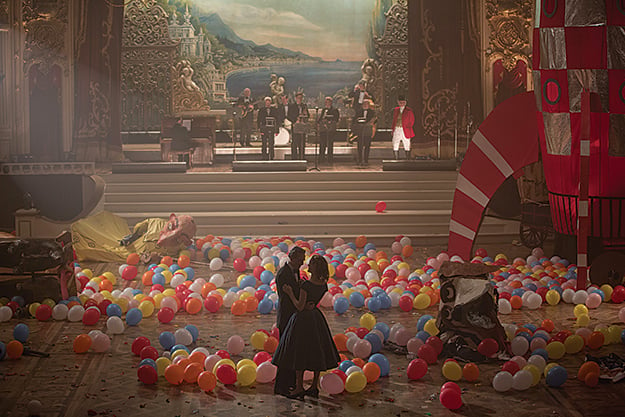
This is essentially a film about war—from the little tyrannical snipes over breakfast to Alma’s drastic ploys to establish not just independence but outright control of her man. It’s hard to understand how anyone could unironically characterize Phantom Thread as a “love story”; rather it’s a film that chooses love, or the need for possession, as the basis of what’s really a horror story.
The background for this is the everyday industriousness of postwar couture. We see the salon shows, as models glide haughtily in front of clients, icily holding up numbers; and the armies of seamstresses who hurry up the Woodcock staircase every morning and line up in their white coats to greet the various aristocratic clients who visit (a wonderful scene has Alma, herself in white, disappearing into the crowd, then asserting her territorial rights when a beautiful princess drops in: “Je m’appelle Alma. I live here”). And there’s the constant evocation of the fine agony that goes into Reynolds’s work: when a countess (Gina McKee) finally puts on her robe of imperial purple, she says, “It’s beautiful, Reynolds. Worth everything we’ve been through”—and you can only imagine what hell they’ve contrived to share, from fitting to fitting.
Phantom Thread is partly a nightmare of male tyranny, another story of what women have to put up when dealing with over-indulged male artists—though that could make it sound as cloth-eared as mother!. Instead, Anderson’s fine-tuned script perfectly captures the little spats of delicate, polite jousting, and also very credibly creates a tone of mid-’50s England. The direction, the elegant pacing, the attention to detail all bring the impression of depth, when the film might easily appear to merely be gliding on beautifully polished surfaces; it all creates a sense of prickly nuance that carries a distinct flavor of Henry James. An extraordinary sense of rapture that pervades the spaces, the objects, above all the costumes, designed by Mark Bridges. It’s there in the stately glide of Anderson’s own stunning (uncredited) camerawork, and the way that its light often suggests the splendor of period fashion photography while keeping the fleshly reality of human presence: one astonishing shot at a dinner table captures the perfect line of Krieps’s neck and shoulder in such a way as to make you imagine the effort of the pose she’s holding. The rapture is there too in Jonny Greenwood’s superb, unexpectedly luscious score, its tremulous ripples of Ravel-like piano bathed in strings that are just restrained enough not to go all the way in suggesting Mantovani (in his day, Britain’s favorite purveyor of orchestral schmaltz).
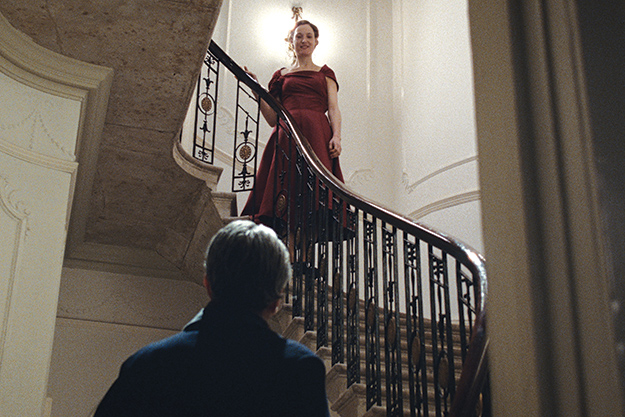
As in The Master, Anderson contrives to get performances which seem most mysterious and nuanced, even when nothing extraordinary seems to be said or done. Day-Lewis plays another of his demon males, and yet is as understated as he’s ever been. His Reynolds has a rather tarnished, aging grandeur, with a fragility that’s almost infantile; his odd, somehow puckered voice, which seems at times to be emerging from a vintage Bakelite radio, is not so much feminine as somehow ancient, the sound of a mummified soul that could crumble to dust if exposed too brutally to the noise and fuss of the world.
As Cyril—at once Reynolds’s faithful attendant and his jailer—Lesley Manville is quietly terrifying, and majestically controlled: every brittle, brutal yet seemingly innocuous remark comes couched in a whole palette of degrees of iciness; when she glares to camera, you blench. She comes across as a woman who has never actually had a mother but come into the world fully formed and fearsome—or who has become the matriarch to her brother, perhaps having actually devoured Mama.
The casting of Vicky Krieps—a Luxembourg actress recently seen in Raoul Peck’s The Young Karl Marx—is a smart move, because she’s a face most of us won’t recognize. You find yourself like one of the social snobs around Reynolds, asking, “Who is this young woman? Do we know anything about her?” Indeed, we know nothing about Alma, but we wonder: how did she end up in the English resort where Reynolds finds her? What is her past? And what did she want, before Reynolds showed her what a muse is supposed to want? Krieps moves with a reserved grace, emotes with a subtle, sometimes harsh mischief, gives the impression of a woman who may well be able to stand still longer than anyone else, but who, on the inside, is trembling almost imperceptibly with energy, appetite, and rage. That tremor is among the strange, elusive vibrations you pick up in Anderson’s latter films. Phantom Thread is perhaps the clearest, least oblique film he has made in recent years, and yet that tremor is palpable throughout: you might say that it is the phantom thread running through this supremely seductive fabric.
Jonathan Romney is a contributing editor to Film Comment and writes its Film of the Week column. He is a member of the London Film Critics Circle.







